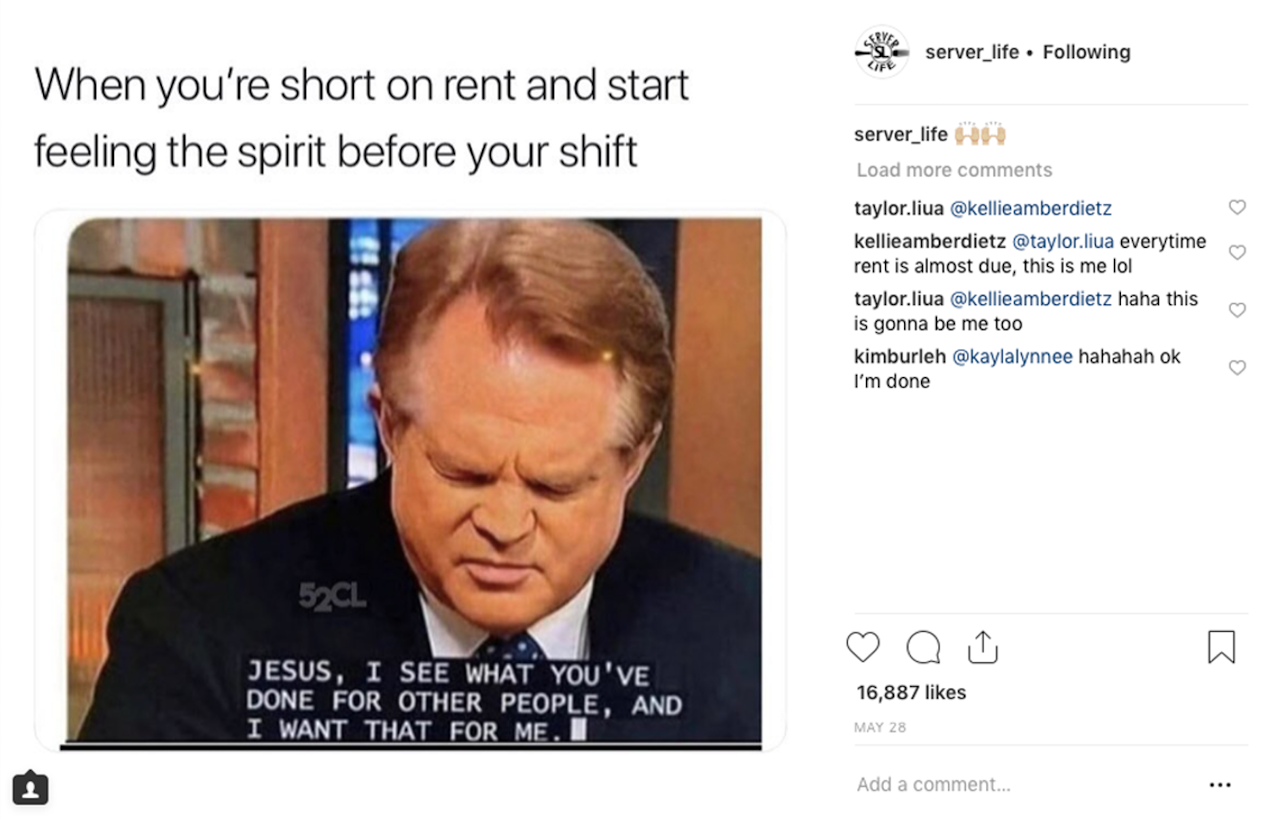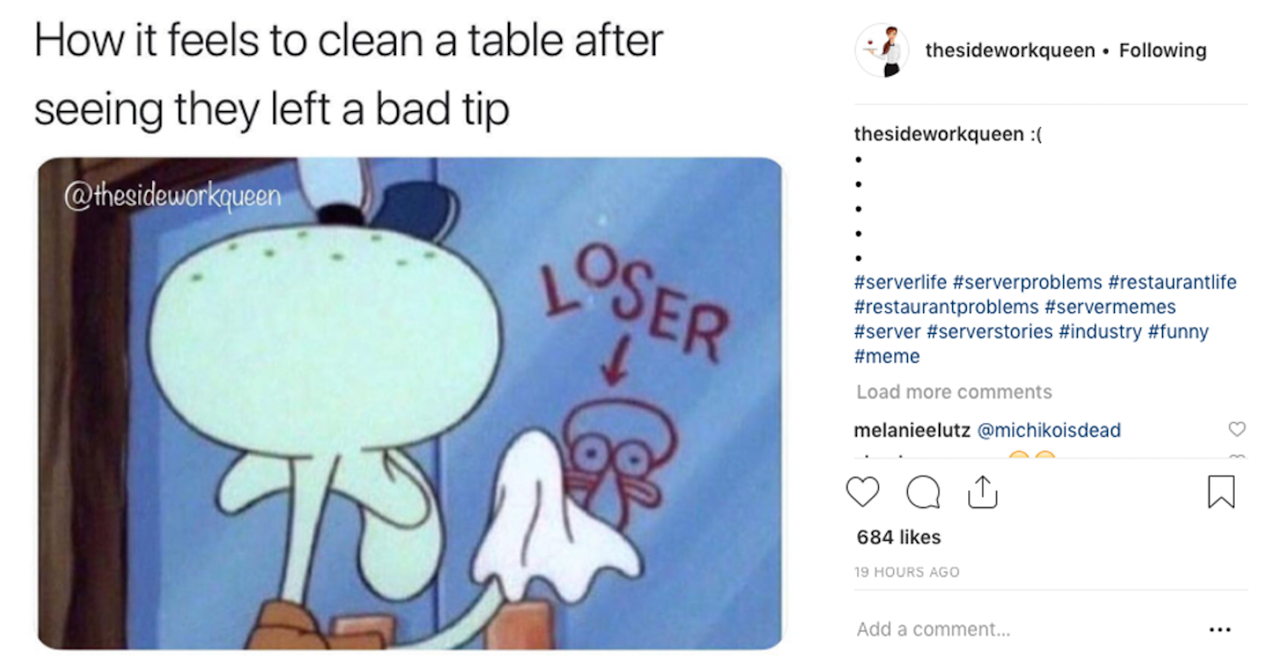Ellie Dessureault bartends at a high-end Mediterranean restaurant in New Hampshire. One night in November, she ran the credit card of a customer, placed the receipt in a booklet, and presented it to him. A minute later, the man, unaware she was merely awaiting his signature, told her to swipe his card, and threw the leather-bound booklet at her face. The 26-year-old caught it and, holding back anger, set it down in front of the man, again. “It’s already done, sir,” she said.
Dessureault has been in the service industry eight years. A day before having a booklet thrown at her face, she posted the following question in “Servers, Bartenders & all restaurant staff… UNITE!”, a private Facebook group with 70,000 members:
“Does anyone else feel completely emotionally numb while bartending?”
Life can be hell for service industry workers, and social media has become a central place for them to air their grievances. For an industry that has over 13 million people, a high turnover rate, and almost no unions, social media has given restaurant employees a chance to build a community. In private Facebook group pages, workers are posting stories about rude customers and asking for advice on how to handle everything from footwear to surly line cooks.
But, because it’s the internet, most of the commiserating revolves around sharing relatable memes. The memes come from accounts like Server Life (634,000 Instagram followers), the Bitchy Waiter (803,000 Facebook followers), and the Angry Bartender (332,000 Facebook followers), and they make fun of common frustrations, such as inept managers and intra-server drama. But, they also tackle consequential topics, like raising minimum wage, being overworked, and sexual harassment. (Other professions also share memes and support each other in online forums; this type of camaraderie is especially popular among two other emotionally laborious professions: nurses and teachers.)
Cesar Silva, 29, created Server Life four years ago while working a slow shift at a Miami restaurant to help service industry workers vent. “I want people to relate,” he said. “We’re a community of people, and we think about the same things.”
The service industry now makes up 10 percent of the country’s workforce. In 2017, sales reached $799 billion, and if the National Restaurant Association’s (the unfortunately-acronymed NRA) projections are correct, the industry will continue to be one of the fastest growing sectors of the economy over the next decade, adding up 1.6 million new jobs. However, these include some of the lowest-paid jobs one can have, and a recent study suggested that waiting tables is more stressful than being a neurosurgeon. In such an environment, coworkers often jostle as they scramble to fill drinks and take orders, not to mention sometimes fight over tables. The industry’s online subculture is important because it provides people to talk to other than your coworkers, according to Dessureault.
“You’ve already said everything you need to say to [your coworkers],” she said. “And you already know they feel the same way, too.”
Chloe Rice, an administrator for “Servers, Bartenders & all restaurant staff… UNITE!”, agreed with Dessureault and added that loved ones who have never worked in a restaurant aren’t much help either because they don’t usually understand a server’s daily frustrations. “If your husband’s an accountant, you can’t explain to him why making desserts pisses you off,” she said. “He doesn’t get it. He has no clue why getting someone an extra side of ranch makes us so angry. Or water with lemons. He’s gonna think you’re nuts. But I can post on that page and someone is like, ‘I hate water with lemons, too.’”
The Facebook groups are filled with disgruntled posts about difficult patrons who tipped poorly or not at all, and the memes ridicule customers who seat themselves, overshare about their life during dinner rush, and enter a restaurant minutes before close.
Darron Cardosa, a 51-year-old career server in New York who turned his blog, The Bitchy Waiter, into a book of the same name, said that cooking television shows, food bloggers, and Yelp have made some customers too entitled.
“They see no problem asking us to ask the kitchen to make something specific just for them,” he said. Cardosa believes customers deserve to be treated well, but he also added that “a lot of times I feel they think they’re better than the people serving them.”
Several people interviewed shared that sentiment, and like most of the service industry’s issues, it seems connected to tipping. Gratuity was popularized in 17th Century England as a way for aristocrats to give a bonus to serfs on top of their wage. When the practice spread to America around the time of the Emancipation Proclamation, it was used as a way for restaurant owners to avoid paying newly freed slaves.
Today, though seven states have mandated restaurant workers earn a full minimum wage, the majority of American servers make the federal tipped wage of $2.13 an hour. After taxes, most servers receive a paycheck for zero dollars.
“The relationship between customers and restaurant workers in America is very warped,” said Saru Jayaraman, co-founder and co-director of the Restaurant Opportunities Center United and director of the Food Labor Research Center at the University of California, Berkeley. “There’s no other major industry in which customers basically determine the wages of workers.”
Jayaraman, who has written two books on the service industry, including Forked: A New Standard for American Dining, said her research shows the power imbalance inherent to tipping creates an environment where sexual harassment is common and that incidents have been cut in half in states where servers are paid the full minimum wage. Her research also has revealed that customers grant gratuity based on racial or gender biases.
While service industry memes do address these issues, the majority of the ones tackling gratuity focus on the performative nature of waiting tables: how degrading it feels to laugh at a customer’s stupid joke and forcing a smile in order to preserve a decent tip. Other tipping memes reveal an economic insecurity over paying bills. The median wage for restaurant employees nationwide is $8.89 an hour. On that income, there is often not enough money to deal with life’s tragedies.
On Nov. 28, six of Eryn Vail’s relatives died in an accidental fire in Logansport, Indiana. Among the dead were her 25-year-old cousin, her cousin’s three children (ranging in age between three and one-month old), her cousin’s stepfather, and her cousin’s 10-year-old stepsister.
The next day, Vail was scheduled to wait tables at a restaurant near her home in Lafayette, Indiana, a 45-minute drive from Logansport. Vail said she wanted to stay in bed all day, crying and cuddling her one-year-old daughter. But, in order reach the funerals safely, she needed to work — she needed money for new brakes for her 1999 Chevrolet Lumina.
She couldn’t call off work and buy new brakes.
At the restaurant, she tried to maintain her composure, but when a regular mentioned she’d heard the news, Vail cried in the middle of her section. When Vail went to get a drink order from another table, the older couple sitting there wanted to know what was wrong. As she cried for the second time, she told them about the fire, and how she was afraid to drive to Logansport because her brakes screeched.
Later, the couple approached Vail and told her to take her car to their mechanic friend. When Vail asked how much he charged, the couple said they were covering the bill.
“I broke down in tears to the point [where] I had to walk away to get water,” Vail told me in a Facebook message.
Vail told me she posted her story in “Servers, Bartenders & all restaurant staff… UNITE!” because stories of positive customer interactions tend to be outnumbered and overshadowed by the negative ones, and she wanted other servers to know how kind and generous her customers had been when she needed help.
Sometimes those negative ones can have unforeseen consequences. Chloe Rice said that people have gotten fired over posts that some found racist, sexist, politically offensive, or were too descriptive in regards to managers, customers, and specific corporate chains. An administrator for another Facebook group page, who spoke on the condition that he and the group page remain anonymous, said people most often get fired when they post photographs of credit card receipts in order to disparage a customer and fail to block critical identifying information about the customer or their employer. However, the example of a negative post that sticks out to him involved a picture of a messy table. He said the server snapped it after his customers left, and in the post, he called them “trash.”
“Someone took a screenshot of the post, looked at his profile, figured out where he worked, sent it to his boss, and got him fired,” he said.
Rice said that “Servers, Bartenders & all restaurant staff… UNITE!” urges its members to delete the name of their employer from their Facebook page. To protect people, she said some groups have instituted rules, including no political, religious, or sexual content, and in some forums, administrators have to approve each post.
Rice, 42, said she spends a lot of time reviewing submitted posts because she can’t work anymore. In 2017, doctors removed a tumor that had been embedded near the top of her spine, and she said, as a result of the surgery, she has tetraplegia (limited function in each limb).
Rice, who had worked in the service industry since she was 17, was a bartender at a Pennsylvania country club when doctors discovered the tumor. “I miss the industry terribly,” she said. “But the page keeps me connected.”
Comments under a post are not reviewed; Rice recalled a time she had to delete a woman’s post because of a wave of negative remarks. The woman had vented about working a long shift without a break and getting hungry. “People were like, ‘You child, better get used to that in this business,’ and ‘What are you, stupid? You know how many times I’ve worked 12 hours without a break?’” Rice said.
For some, pulling a shift like that is a source of pride, a strange way of coping with exploitative conditions by bragging about how much punishment one can take, but it’s a labor law violation in eight states. The Fair Labor Standards Act requires restaurant owners to pay overtime, but, in most states, there are no additional laws forcing owners to provide breaks to workers or limit shift length.
A lot of memes depict how servers feel rundown after days of multiple double shifts. The memes also express frustration over not knowing when a shift is going to end and the joy of running out of a restaurant the moment one can. This issue is connected to tipping, as well.
“When you pay someone so little, we have found that there's a perverse incentive for an employer to keep somebody for long hours if they don't have to pay them very much,” said Jayarman. “And workers make so little money in tips, they want to stay longer in order to make more.”
Having an overworked and underpaid labor force in an industry that serves the public food and is increasingly vital to the economy doesn’t sound like a good situation. Dessureault explained that being drained physically led to her cynicism. “After a while, you almost don’t feel like a person,” she said.
Dessureault also felt guilty about complaining. Since most of her coworkers and customers treat her well, she said she “probably just needs an attitude adjustment.”
But the tone of most server memes, as well as many of the Facebook group posts, suggests others feel emotionally numb. If that’s the case in a $799 billion industry, maybe the industry, not the workers, needs to change.





